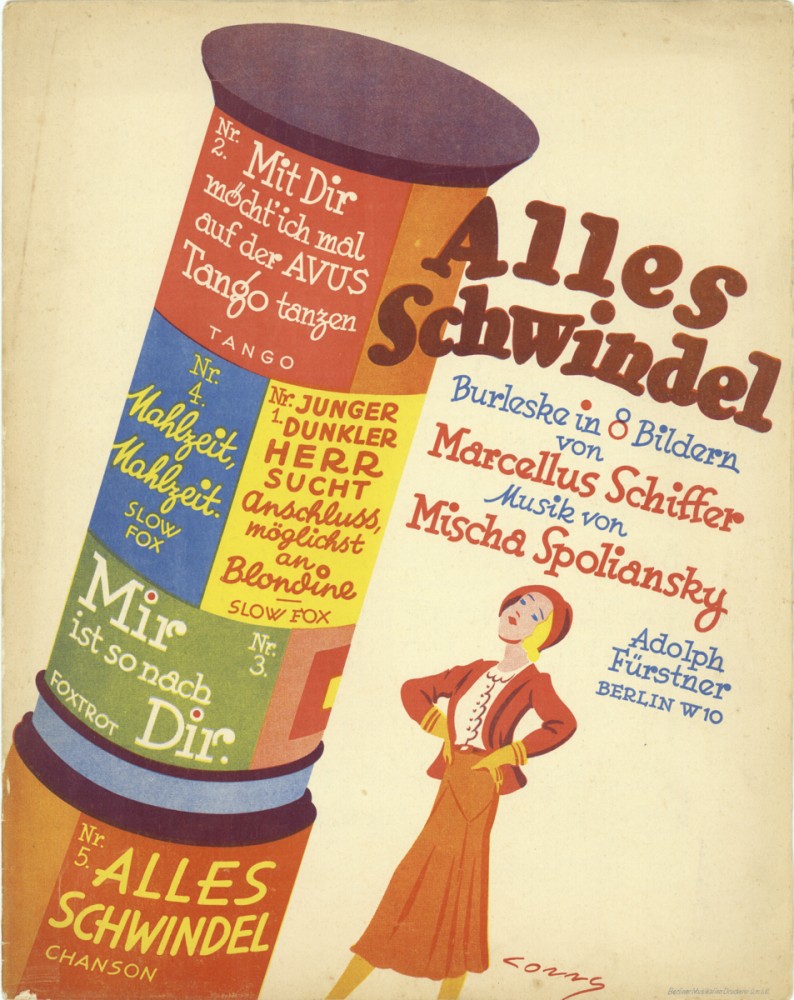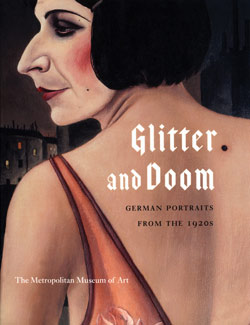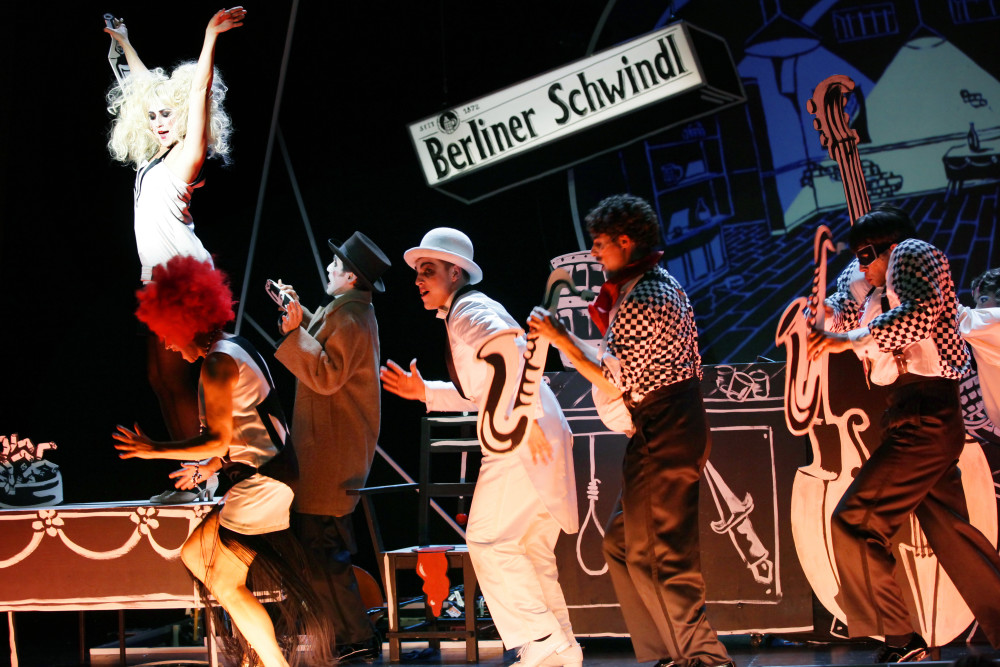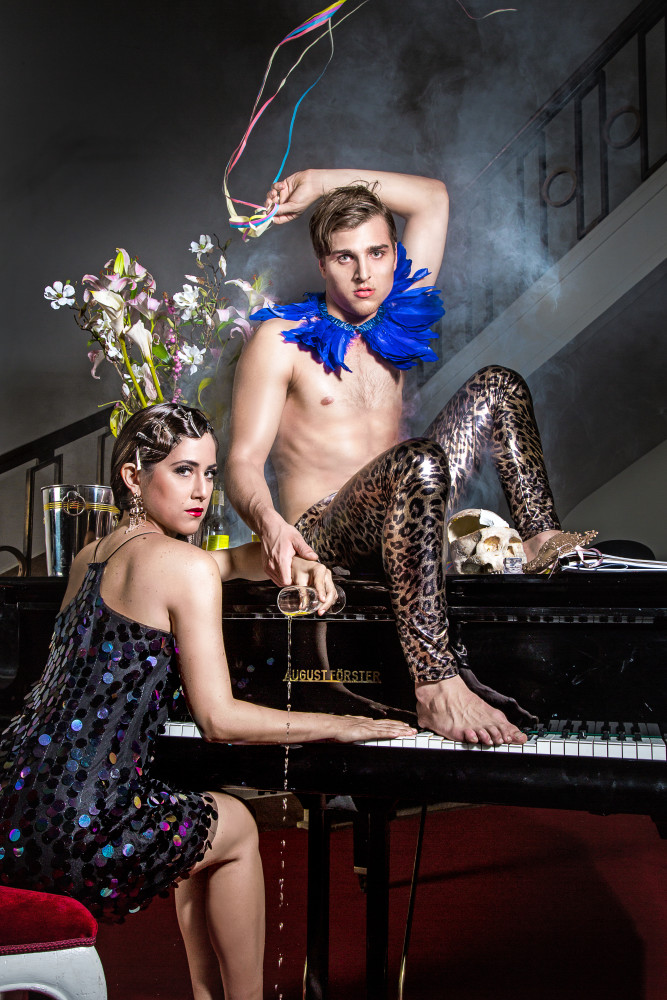Kevin Clarke
Operetta Research Center
17 December, 2017
In a way, it’s what every operetta fan secretly dreams of: you go to a performance with new unknown singers, and you hope that one of them might turn out to be a real sensation, someone who can compare with the very best of the past. Or even surpass them. Sadly, this rarely happens. But when it does the shock is all the greater. And one such shock occurred last night when I first saw the “high-cheekboned, floppy-haired” Jonas Dassler, showing “strong heartthrob potential” (as Variety noted in a review of a film he’s in: LOMO – The Language of Many Others). Dassler plays the male lead in Spoliansky’s “Burleske in 8 Bildern” Alles Schwindel at Berlin’s Gorki Theater, a role originally created by Gustaf Gründgens who performed it next to Margo Lion. What Mr. Dassler does with this character goes way beyond “heartthrob” and “high cheekbones,” he simply takes possession of the stage and demonstrates that young actors trained at the Ernst Busch Hochschule can sing and dance like Gene Kelly, do acrobatics in their dance routines, dominate the stage like a real superstar – at age 21. And deliver one of the greatest all-round operetta performances I have seen in recent years. A young male equivalent to Dagmar Manzel’s all-consuming senior female Cleopatra. And that’s saying a lot!
Alles Schwindel is a Burlesque that Spoliansky wrote in 1931 together with librettist Marcellus Schiffer. It’s a dark-humor portrayal of a society where everyone is bankrupt but puts on a show – the bank director throwing an engagement party for his daughter, which he cannot afford, the son-in-law who marries for money, even if there isn’t any, the chauffeur who pretends to own his employer’s Rolls Royce, and the shop assistant who claims to be a great lady, wearing borrowed clothes from her shop’s ladies department. There are scenes set in a burglar’s tavern where the criminals are all fake and where the so called high society goes for the thrill of the dangerous. No one is who he says he is – almost like Offenbach’s La Vie Parisienne, updated to Berlin in the early 1930s.

Gustaf Gründgens and Margo Lion in “Alles Schwindel” 1931. (Photo from Viktor Rotthaler, “Marcellus Schiffer: Heute nacht oder nie,” Weidle Verlag 2001.
When the show premiered in Berlin, rising sensation Gustaf Gründgens played Tonio Hendricks, who turns out, at the very end, to actually be the real owner of his Rolls Royce, but who wants to pretend to be a chauffeur for the erotic thrill of it. Next to Gründgens there was the equally thrilling Margo Lion as Evelyne who claims to be Erna Schmidt, but then really is the US billionaire’s daughter. The press in 1931 didn’t react too positively to the story and text, as Viktor Rotthaler reports in Marcellus Schiffer: Heute nacht oder nie. While they praised the “melodic perfume” of the music and the “grace” of the composition, critics complained about the “black nothingness” of the story.

The original 1931 poster for “Alles Schindel.”
The show was quickly forgotten; it never had the career of other Spoliansky pieces such as Zwei Krawatten oder Rufen Sie Herrn Plimm! But in the course of the recent Spoliansky revival, Alles Schwindel was dug up once more and given a studio production in Dresden at the Semperoper, a production that doesn’t quite manage to stylistically meet the demands of such a satirical Weimar Republic social farce.
Now, almost like a miracle of miracles, the Gorki Theater in Berlin is joining the premium league of Berlin’s operetta stages – together with the Komische Oper, premiering Abraham’s Märchen im Grand-Hotel simultaneously and the Tipi am Kanzleramt, reviving Frau Luna once more.
Gorki gave in to Christian Weise’s wish to try an operetta at this highly political stage so far away, in approach, to the other entertainment stages. They gave Weise a cast of first rate actors that nail the particular ‘black’ style of the lyrics perfectly with their character voices and stage personalities. Greatly assisted by the grotesque costumes of Adriana Braga Peretzki and Frank Schönwald. Like in Weise’s earlier production of Wie werde ich reich und glücklich in Weimar, you get an almost cartoonish evocation of the ‘Glitter and Doom’ era of Germany.

The “Glitter and Doom” catalogue of the Metropolitan Museum of Art, 2006.
In the midst of all this colorful ‘doom’ there’s the stand-out performance of Jonas Dassler as Tonio Hendricks. He comes onto the stage in a white tight tux that he wears like Johannes Heesters – but with more sex appeal.
And then Dassler starts dancing, simply rocking the place. Add to this a suave singing voice that never (ever!) becomes ‘operatic’ but sticks with the natural vaudeville style that Spoliansky/Schiffer require. I.e. this is a total contrast to the recent Dresden Spoliansky enterprise.
If you think all of this isn’t enough already, also add a breathtaking acting talent and great sense of comic timing. And, to top it all, dizzyingly acrobatic skills. If you’ve enjoyed people walking up walls and dancing on the ceiling à la Fred Astaire, wait till you see what Mr. Dassler does at the end of the evening. (Choreography: Alan Barnes.)

Vidina Popov, Catherine Stoyan, Mehmet Yılmaz, Jonas Dassler, Alexander Darkow, Johann Jürgens in “Alles Schwindel” at Gorki Theater, Berlin. (Photo: Ute Langkafel)
There is a small band on stage, producing a surprisingly ‘mellow’ sound that is not quite as ‘acid’ as the story. But it’s great to listen to, making it all the more desirable to have a full recording of this production – for eternity, and for all the people who are not in Berlin.
Considering that Max Hopp almost reigned supreme in the male operetta lead department in Berlin (with Tobias Bonn as a close follow-up), it’s refreshing to see a younger competitor entering the field. He is a very serious competition, should Mr. Dassler decide to take on more operetta roles.
Given his talent for singing and dancing, there is nothing I’d wish more. But he’s already being snapped up by film producers and other ‘serious’ theater companies. Let’s hope they will not keep him from more musical comedy productions. If Ryan Gosling can do it, i.e. bridge art house films, blockbusters, and musicals, Jonas Dassler should be able to do it too. And if any of the German language operetta theaters, such as the Komische Oper, the Staatsoperette, the Gärtnerplatztheater, or the Musikalische Komödie Leipzig and Volksoper Wien have their wits together, they should hire Mr. Dassler for upcoming projects as quickly as possible.

Promotion picture for “Alles Schwindel” at Gorki Theater, with Vidina Popov and Jonas Dassler. (Photo: Esra Rotthoff)
One pleasant surprise at the preview of Alles Schwindel was that a totally different audience came to see this Spoliansky/Schiffer Burlesque. You could say the operetta fever is slowly spreading and reaching more and more groups of people. That’s amazing. Also that a young girl sitting next to me laughed her head off all evening. It seems the once criticized Schiffer humor has not lost its touch. And as presented by Jonas Dassler and Vidina Popov as Evelyne there are – at last – two performers who can overcome the shadow of Gründgens and Lion. And that sort of says it all…. Doesn’t it?
So even secret operetta dreams come true, sometimes. And that’s the best news of all. Thank you, Gorki, Christian Weise, and Jonas Dassler.
For more information and performance dates, click here.
